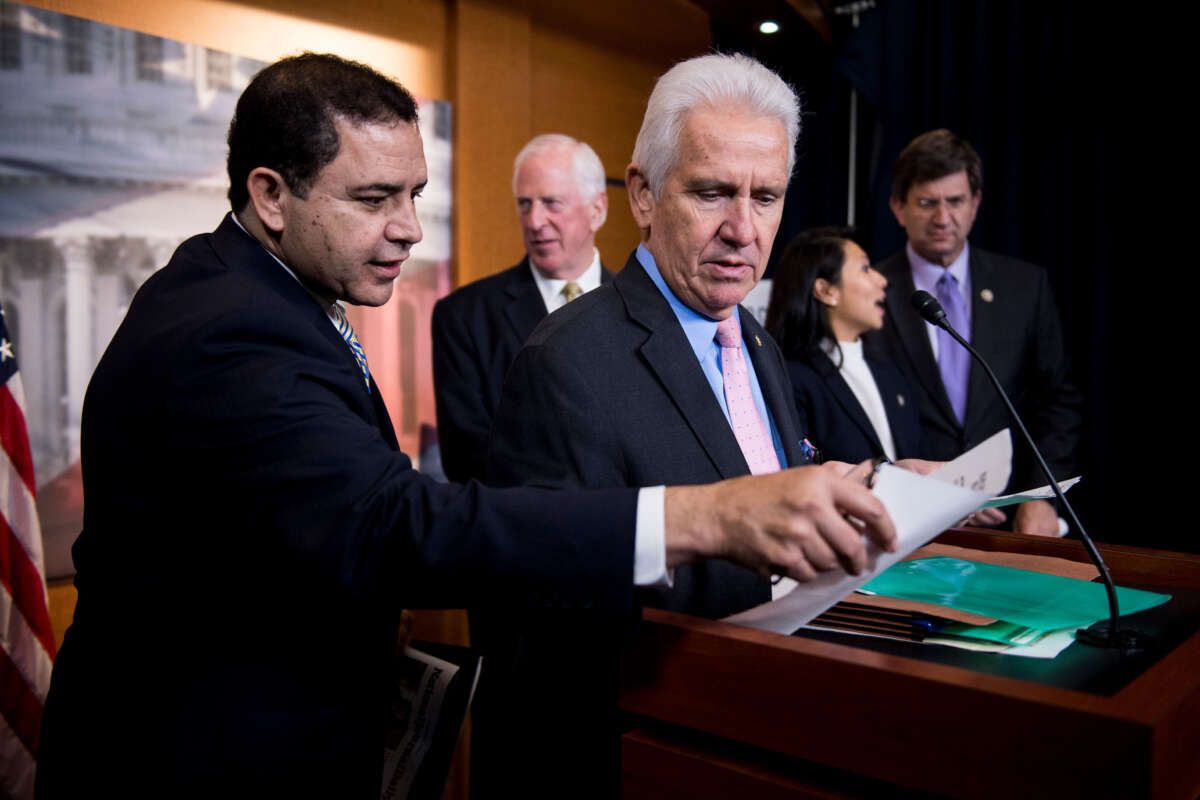Honest, paywall-free news is rare. Please support our boldly independent journalism with a donation of any size.
The Democratic Party’s conservative Blue Dog Coalition has been slashed in half due partially to a disagreement within its ranks over efforts to attract more members, Politico reported on Tuesday, with a number of corporate lawmakers insisting on preserving the Blue Dogs’ “longstanding legacy” and name despite its reputation as a “Southern ‘boys’ club’.”
U.S. Reps. Abigail Spanberger (D-Va.), Ed Case (D-Hawaii), David Scott (D-Ga.), Brad Schneider (D-Ill.), Lou Correa (D-Calif.), and Mike Sherrill (D-N.J.) all left the coalition earlier this month after the 15 members held a secret-ballot vote on changing the group’s name to the Common Sense Coalition.
The name change, the departing members argued, would help the group to recruit more lawmakers as it has reached an all-time low, 16 years after the Blue Dog alliance was forced to impose a cap on its membership to keep it at 20% of the Democratic caucus.
Despite the group’s large roster during the George W. Bush and Obama administrations, a spokesperson for the Blue Dogs claimed Tuesday that they “have never prioritized having a large coalition” and are focused on what they refer to as “fiscally-responsible policies [and] ensuring a strong national defense.”
“With a narrow majority governing the House, even a smaller group of members focused on getting things done for the American people on these issues can and will play a vital role,” Andy LaVigne, the group’s executive director, told Politico.
A desire to remain insular instead of appealing to a broader group of Democrats is “exactly the charge you’d expect centrists to lob at progressives,” said Nick Field of Decision Desk HQ.
While the Blue Dog Coalition has long claimed to represent “mainstream American values” and the “commonsense, moderate voice of the Democratic Party,” the group’s contraction in recent years has coincided with the steady growth of the progressive “Squad” in the U.S. House and a wealth of evidence that the majority of Democratic voters are not aligned with the Blue Dogs’ longtime push of austerity policies.
The Blue Dogs — both those who are staying in the coalition and those who are leaving — have attacked progressive policies as unrealistic and divisive.
Meanwhile, the informal Squad, whose members do not accept corporate PAC donations and are proponents of a Green New Deal, Medicare for All, and other bold policy proposals, has grown to include lawmakers from states including Texas, Florida, Pennsylvania, and Missouri since the group’s first four members were elected in 2018. Around 10 lawmakers are now part of the Squad, which started with Reps. Alexandria Ocasio-Cortez (D-N.Y.), Rashida Tlaib (D-Mich.), Ilhan Omar (D-Minn.), and Ayanna Pressley (D-Mass.), and their influence has been made clear across the party as more than 70 Democrats in the 118th Congress have sworn off corporate PAC contributions.
While policies pushed by the Squad are broadly popular, the dwindling Blue Dog Coalition includes the last remaining Democrats who oppose abortion rights and marriage equality. The members who stayed after this month’s vote include Reps. Sanford Bishop (D-Ga.), Mike Thompson (D-Calif.), Josh Gottheimer (D-N.J.), Jared Golden (D-Maine), Henry Cuellar (D-Texas), Jim Costa (D-Calif.), and Vicente Gonzalez (D-Texas). Rep. Wiley Nickel (D-N.C.) has not confirmed whether he’ll stay or go.
The departure of nearly half of the coalition suggests that the Blue Dogs “are on their last leg,” tweeted Lindsay Owens, executive director of the economic justice group Groundwork Collaborative.
With the splintering of the conservative group, said Sam Shirazi, a civil rights attorney and commentator on politics in Spanberger’s state of Virginia, “the long decline of the Blue Dog coalition continues.”
Media that fights fascism
Truthout is funded almost entirely by readers — that’s why we can speak truth to power and cut against the mainstream narrative. But independent journalists at Truthout face mounting political repression under Trump.
We rely on your support to survive McCarthyist censorship. Please make a tax-deductible one-time or monthly donation.
